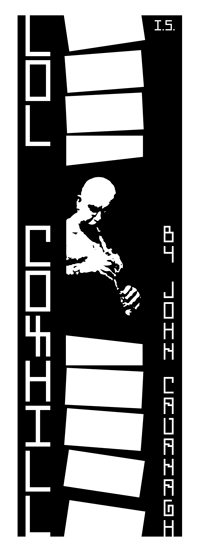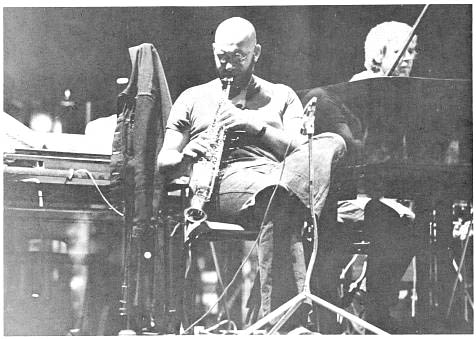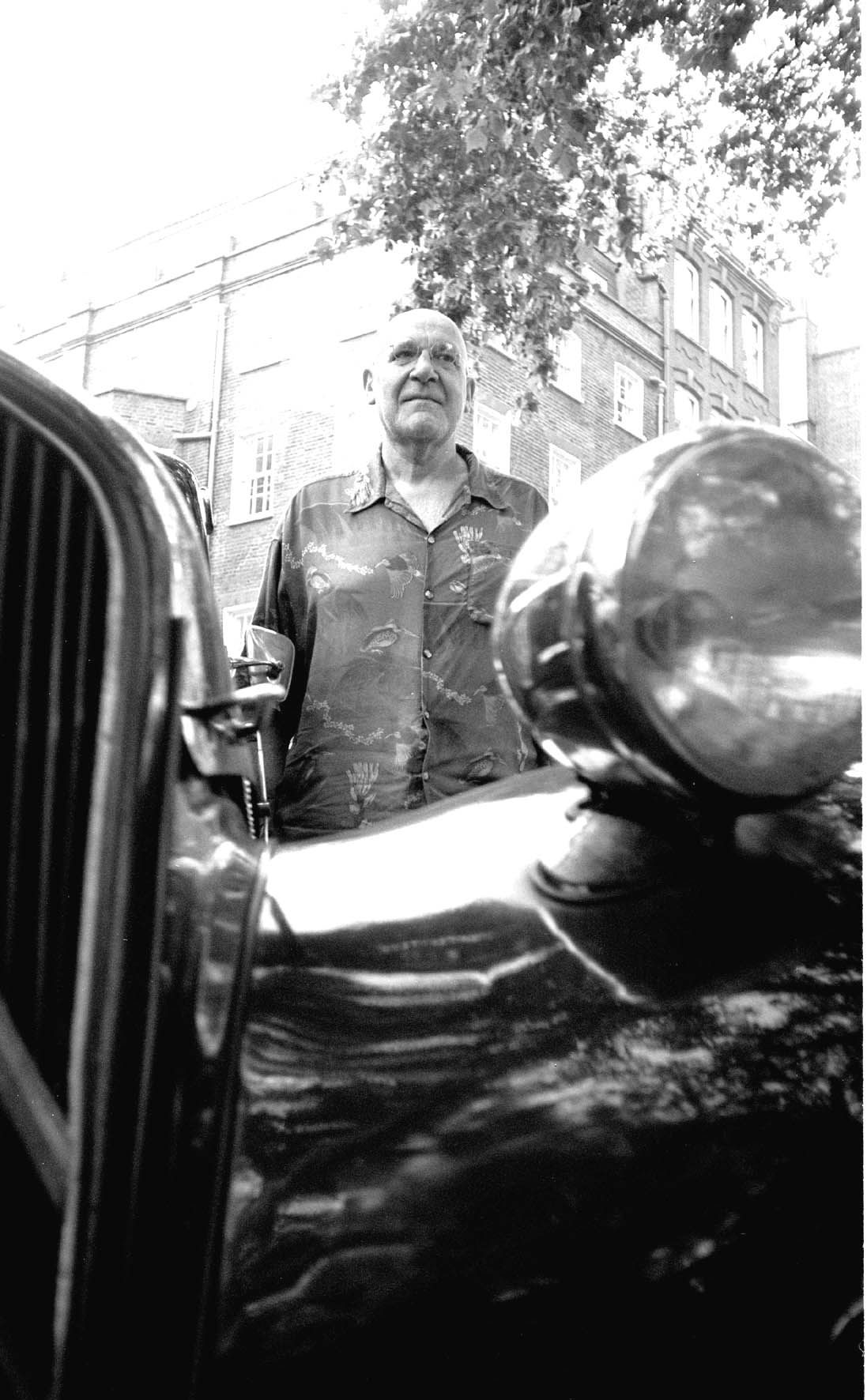
By way of an introduction, I’m going to rerun one of Nigel Cross’s reviews that we published last issue, since it probably says everything that needs to be said anyway.
LOL COXHILL - SPECTRAL SOPRANO
(CD from EMANEM, 3 Bittacy Rise, London NW7 2HH)
At last! A double CD set that attempts to put the career of one of Britain’s greatest underground musicians into some kind of perspective. Subtitled ‘solo and group improvisations 1954-1999, r’n’b, jazz, electronics, spontaneous music, an open rendition of an old play and the odd bit of singing’, this collection does the impossible and gives an overview of the saxophonist’s long and varied journey through life.
Those of you who only know Lol through his work with Kevin Ayres [and by the way Hux currently have a cornucopia of rare and unreleased Ayres material on catalogue such as Banana Follies (HUX 007) and Too Old To Die Young (HUX 006)] will be surprised by the breadth of the stuff on offer here. After all this is a man who’s played on some of the biggest concert stages in the world, and some of the smallest, and on Ready Steady Go and on many a street corner, even in Hyde Park! Packed full of rare photos and annotated by the great man himself, there’s even a reprint of Mal Dean’s infamous cartoon portrayal of Lol from whence this set got its name.
Sadly there isn’t enough space to do this set full justice – I think it’s time the Terrascope devoted a whole article if not an issue to the exploits of one of free music’s most beloved institutions. Long may he blow!
Nigel – this one’s for you, mate. Phil McMullen.
PT: For a musician who has spent so long looking forward and moving forward, ‘The Spectral Soprano’ has been an uncharacteristic overview of the past. Tell me how you approached putting that together?
LC: It certainly isn’t the first record that I’ve made which covers different areas of what I’m involved in. It is though the first attempt to find old stuff and relate it to newer things as well. It wasn’t originally intended to come out on the label that it finished up with, in that they normally only deal with improvised music. As everything went wrong with the release, Martin Davidson of Emanem (I’m on the label anyway) thought just this once he’d put out this record of my jumble and hope he’d get away with it. Fortunately it’s covered itself fairly quickly, and he’s come to like some of the bits he wouldn’t’ve liked in the first place. Had it not been for him it couldn’t have happened – he really helped with improving all the different bits from all different sources.
It begins with recordings made in 1954.
That’s right. I’d been in the RAF doing National Service. I was playing a bit when I was there… I had an alto saxophone but I was better at looking as if I could play it than I was at playing it! When I came out, around 1951 or something, I immediately looked for a decent saxophone and became more involved in it. So, this first stuff was after I’d been studying for a couple of years. Some of it is a bit romantic but it’s a good place to start. I hadn’t had very much experience at playing but I knew what I was doing and it still sounds OK.
What were the first sounds you remember that made you want to get involved in making your own music?
Well, all of my family were into music. My father went to South Africa and other places and found recordings that couldn’t be found anywhere else and I just became interested in all these different sounds - I still have almost every 78 that I had as a kid.
I suppose you still having all those records you had when you were very young is a key to how good an archivist you’ve been of your own material, because so many people that record don’t have the back catalogue in their possession at all…
Oh, I don’t have all of mine – some of my records I’ve never heard! I didn’t know they existed before I read it somewhere!
But you do seem to have been fairly good at hanging on to early tapes.
Early stuff like Tony Knight’s Chessmen was done on a 1⅞ reel-to-reel and that sounds alright.
I think Tony Knight’s Chessmen was really your first proper band, wasn’t it?
The first pro band, yeah. I was working in a factory and playing with them for a while and then we started playing bigger venues in London, where they were based, and then when Rufus Thomas came over at the time of ‘Walkin’ the Dog’ we did a tour with him, and that was the start. I don’t know how I came to meet Tony Knight or any of the Chessmen though! It’s quite likely that I answered something in the Melody Maker, or possibly when I was busking. I finished up doing gigs with various people.
The live shows were, I’m sure, memorable for the people who managed to see them – but of course some of that performance with Rufus was captured on film for posterity?
Oh yeah, that’s right! It was for ‘Ready Steady Go’. I remember having real problems trying to get the money for it. The Musician’s Union insisted that I was mistaken, that I’d never been on TV with Rufus Thomas – I asked them whether they’d like to refer back to the people who made the video or prefer to see my copy which I’d recently bought from a shop, but they argued and argued that Rufus Thomas had never even been on Ready Steady Go.
Of course the irony is that when you see the film, between 1964 when it was shot and the 1980s when the video was reissued, you’re the one that’s most recognisable in the line-up as far as change of appearance is concerned…
I was the only one with a bald head!
You mentioned the connections you made through busking, can you tell me a bit more about that experience?
I did it for a really long time… that’s how I got involved with John Stevens. He told me about the Little Theatre Club and invited me along to sit in, so I went there and Evan Parker and Trevor Watts were playing. I started playing with them more and carrying on in that direction rather than looking for bands to be in.
You never knew who would be watching you – one day I believe there was a girl in the back of a car at some traffic lights for example?
(laughter) Yeah, I wonder if that’s true? I was playing outside the Festival Hall when Joni Mitchell did a gig there. I was busking afterwards and it’s been mentioned in a couple of books about her that she was in a cab and heard someone playing on a corner and for some reason she knew it was me and was going to come across to join me - but the lights changed and it never worked out. And then the record (‘Ladies of the Canyon’) came out and there’s this song ‘For Free’
Can we talk about your involvement with Kevin Ayers and the Whole World – a very interesting line-up in that band.
Mick Fincher (drummer on ‘Shooting at the Moon’) was a mate of mine from the Aylesbury area who finished being in the band for a while. David Bedford, Mike Oldfield….
Mike Oldfield would’ve been very young at that time
Yeah, he was about 17 – we had to sign him in when we went to Amsterdam for the first time. He was always working on things up at the Manor, scoring bits of tape and whatnot to get his stuff down. He did some work for them as well in return for the use of the gear and whatnot.
Kevin Ayers always struck me as someone who could probably have been a much bigger “pop star” had he been prepared to play the game.
Yeah… he could’ve been more popular. He’s a bit like me in a different way – what we want to do is important, even if it’s not very important (laughs)
Tell me something about those live shows with Whole World…
I can’t remember a lot of it, I was quite out of it most of the time! They were good because you never know which angle it was going to take, even if we had a partially set programme it went off at odd angles and good improvisations came up that got quite garbled at times. I just thought it was interesting.
It was a fairly short-lived line-up but of course some of those people appeared on your next recording project, ‘The Ear of the Beholder’ for John Peel’s Dandelion label.
That originally was a double album, parts of which have been lost to a single CD reissue. It’s got a very diverse selection of material. I did things with David Bedford, little duos and stuff, and some free sections – I think one of them was ‘Rasa Moods’. There’s a nice thing on it that wasn’t anything to do with the people from the Whole World where I was doing some street recordings with John Peel down by the Thames. A load of kids came along and wanted to listen and I said “only if you sing”, so they ended up on it singing ‘Jamaican Rumba’.
Peel’s Dandelion label was a great creative playground. I can’t imagine another place that Principal Edwards’ Magic Theatre and Bridget St. John could’ve all been under the one umbrella, except maybe Elektra in its golden era…
Yeah, it was very open. Bridget and I had a band for a little while, though we only did few gigs. It wasn’t what she wanted. I think it was a bit too open at times whereas she might’ve preferred it to be a bit more anchored.
After that you moved to another small independent label called Virgin Records, which had slightly different aspirations and financial achievements to Dandelion. What were your first impressions of Richard Branson?
I didn’t get to know him very well. He was paying for it and was allowing me to do whatever I wanted, not as many records as I might’ve wanted, but he never had any control over what I wanted to put down whether he liked it or not. He never did me any harm – might’ve been able to do me more good…
The Manor Studios, designed I think by Tom Newman who’d been a member of July, was important to the creative processes of Virgin in its early days…
I’ve done things there with people other than Kevin and the band, but I can’t remember what they were. Haven’t got much of a recollection of what it was like other than that it was big, and someone was supposed to have died in the lift!
Is there anyone else you remember running into at the Manor? Daevid Allen, Steve Hillage, Gong – all those people would’ve been there….
I don’t know if I met them there. I knew them anyway and was doing odd things with different people.
With ‘Fleas in Custard’ you began trying out some electronic treatments with David Vorhaus, who’s best known for his work with White Noise and Delia Derbyshire. When did the interest in electronics begin for you?
I’ve been interested in electronics since a kid. It was the opportunity rather than the interest I think. I’d been fiddling around with little electronic instruments, most of them breaking almost immediately.
What I find a strange contradiction in the way some people have decided to address your work is that you perform in a free expressive music medium which should be about free expression, so if you choose to express yourself (as you have done) with a nod to music hall or by doing a bit of acting, isn’t that freedom? They want you to do your “free music”, but only the free music that fits into a narrow confine.
There must be about 30 pigeonholes that I’m stuck in depending on who’s thinking about it. I’m in a funny position relating to that because yes, you should be able to do what you choose, but if I’m in an improvising situation and I want to do something that’s a bit outside of the central feeling of everything, that doesn’t mean I’ll necessarily do it. I just want to be able to do what I think is right at the time. I think it’s getting easier, but it’s always been a bit of a pain.
You’ve been known as a solo performer but also in several fairly regular group line-ups, things like Chris McGregor’s Brotherhood of Breath and so on across the years.
That’s gone on into the Dedication Orchestra now. I’m still working with them when we get the chance. Harry Beckett is an old friend… Steve Beresford I work with a lot… Even Parker…. I maintain links with people. I might play with someone I haven’t seen for 15 years and it’s still OK when it comes up.
Another thing that took you on a completely different path, but still true to what you said about musical freedom, was working with the Damned….
Why not? They liked me because I improvised and did whatever I wanted, and the fact that some people disapproved of that. We did one concert, in a theatre at the top of Charing Cross Road. I bumped into Dave Vanian in the street and they said they were doing a gig there and did I want to go along. I said I hadn’t got my saxophone, but they said to come along anyway. So, I went home and put on a woolly fairisle pullover and some plus-fours – a highly unlikely costume! There’d previously been some production there which had used armchairs and stuff so I made a little sitting-room on stage in the middle of the Damned and sat there and read a book throughout the gig. People were really pissed off. There was a load of punk blokes really offended that there was this old bloke sitting on stage and reading a book! People were gobbing at me and I was pretending it had hit me on the face and would wipe it off and eat it.
Nice!
None of it did hit me and I didn’t eat it anyway. A very good gig though, and so many people were upset about it. A lot liked it as well.
So, what’s next for Lol Coxhill?
Nothing specific planned. Well, the next thing as we speak is Bob Cobbings’ funeral, I’m playing for that. He’s somebody I’ve known for at least 30 years and had played with him just a few times up until several years ago when we started working together with Hugh Metcalfe and Jennifer Pike as Birdyak, a poetry and improvised music group. Now that Bob’s “retired from life” we’re going to carry on doing things anyway and change the name slightly, YukYuk or something. Bob said he’d like it to carry on.
Lol Coxhill was interviewed by John Cavanagh, and the Terrascope would like to express its heartfelt thanks to both of them for finding the time in their hectic schedules to talk to us. © Ptolemaic Terrascope, 2003
In memory of Lol Coxhill: 19 September 1932 – 9 July 2012.

|
